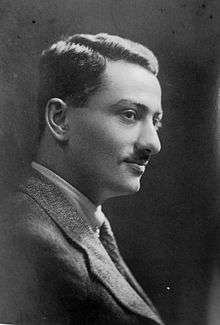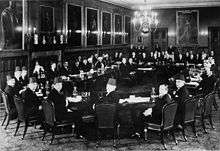Musa Alami

Musa Alami (May 3, 1897 – June 8, 1984) (Arabic: موسى العلمي, Müsə al-‘Alāmi) was a prominent Palestinian nationalist and politician. Due to Alami having represented Palestine at various Arab conferences, in the 1940s Alami was viewed by many as the leader of the Palestinian Arabs.[1]
Alami was born in the Musrara district of Jerusalem, Palestine[2] into a prominent family. His father was Mayor of Jerusalem Faidi al-Alami, his sister was married to Jamal al-Hussayni and he was the uncle of Serene Husseini Shahid.
He was first taught at the school of the American Colony and at the French Ecole des Freres in Jaffa. During World War I Alami worked at the censorship office in Damascus. Alami retained a positive view of the Ottoman empire; recalling that the Arabs regarded the Turks as partners rather than oppressors, and above all: Palestine was largely ruled by Palestinian officials. Alami claimed that "a greater degree of freedom and self-government existed in Palestine than in many Turkish provinces".[3]
Later he studied law at Cambridge University and was admitted to the Inner Temple and graduated with honors degree.

Upon his return to Jerusalem, Musa Alami worked for the legal department of the government of the British Mandate of Palestine and eventually became the private secretary of the High Commissioner General Arthur Grenfell Wauchope. In 1934, Alami participated in talks with the leaders of the Jewish community in Palestine David Ben-Gurion and Moshe Sharett. According to Ben-Gurion, he suggested that the Zionists could provide significant help developing the region, but according to Ben-Gurion, Alami replied that he would prefer waiting one hundred years and leaving the land backward, as long as the Palestinians could do the job themselves.[4]
Alami was ousted from his government position as legal adviser by the British authorities and went into exile in Beirut, and later in Baghdad. He played an important role in St. James Conference, negotiations with the British government in London in 1938–1939.[5] He was a major contributor to the White Paper of 1939.
Former British diplomat G. Furlonge, who was the author of Alami´s biography, described the political scene in Jerusalem after the establishment of Israel in 1948: "The new [Palestinian] leaders were a set of young men of some education, all of them in the traumatic condition induced by the consciousness of having suffered a resounding defeat at the hand of an enemy whom they had heartily despised."[6]
In an opinion article published in 1949, Alami gave his assessment of the "great national disaster" suffered by the Arabs of Palestine.[7]
- "[T]he British were the prime causers of the disaster, and on them lies its responsibility. They were assisted by the Americans and the Russians. So much is clear. At all events, we found ourselves face to face with the Jews, and entered into battle with them to decide the future; and in spite of what the British, the Americans, and the Russians had done, it was still within our power to win the fight."[7]
- "There were two phases to the battle of Palestine. ... In the first phase the fundamental source of our weakness was that we were unprepared even though not taken by surprise, while the Jews were fully prepared. ... These same weaknesses were the source of weakness in our defense in the second phase, that of the Arab armies: disunity, lack of a unified command, improvisation, diversity of plans, and on top of all a slackness and lack of seriousness in winning the war."[7]
- "The evacuation and homelessness of the Arabs was planned and intended by the Jews."[7]
- "In the social sphere, the incompetence of the Arab governments has revealed itself in the matter of the refugees. ... It is shameful that the Arab governments should prevent the Arab refugees from working in their countries and shut the doors in their faces and imprison them in camps."[7]
- "With the establishment of a Jewish foothold and base, the Arabs are faced with a new danger. The ambitions of the Jews are not limited to Palestine alone, but embrace other parts of the Arab world. ... The next step will be an attempt to take all of Palestine, and then they will proceed according to circumstances - circumstances which they themselves will attempt to create."[7]
After the 1948 Arab-Israeli War, Alami lost most of his property in Jerusalem and the Galilee and went to live near Jericho,[8] where he acquired a concession of 5,000 acres (20 km2) of desert from the Jordanian government. In 1952 he founded the Arab Development Society (ADS)[9] to help Jericho's refugees.[10] After he discovered water he founded a large farm and school for refugee children.[11] Alami raised funds for building villages for the refugees and founded an agricultural farm whose produce was exported.[12]
According to Gilmour, who interviewed Alami in February 1979 in Jericho:
Both the farm and the school were highly successful until the Israeli invasion in 1967, when two-thirds of the land was laid waste and twenty-six of the twenty-seven wells destroyed. The Israeli army systematically smashed the irrigation system, the buildings and the well-boring machinery. Most of the land quickly reverted to desert.
Perhaps some of the destruction was unavoidable in wartime but what seems utterly callous and outrageous is the way Israeli authorities have behaved since 1967. A chunk of land was predictably wired off for "security reasons" and turned into a military camp. It is now deserted, [...] the Israelis refused to allow him to buy the necessary equipment either to restore the damaged wells or to drill new ones. So he made some manual repairs to four of the least damaged wells and with these he was able to salvage a fraction of the land and keep the farm and the school functioning. ...[The Israelis] are now telling him that he has too much water – though he has less than a fifth of what he used to have – and have warned him that they will be fixing a limit on his consumption and will be taking away the surplus for their own "projects" (i.e. their expanding settlements near Jericho).
...[Alami] laughs at President Carter's obsession with human rights because he knows they will never be observed in Palestine. "Liberty and justice are meaningless words for my people and my country. We have never known either." He waves towards his farm, a philanthropist's dream that was once brilliantly successful. "I gain no pleasure from this place now," he says, "I stay here out of duty. I know the Zionists have been wanting to get rid of us for years. They want me to go and have told me so. They want to build a kibbutz here. But I have a duty to keep going, a duty to my people."[13]
Musa Alami died in Amman on June 8, 1984, as a result of circulatory collapse."Musa Alami, Founder Of an Arab Aid Group". New York Times. June 16, 1984. Retrieved January 21, 2016. His funeral took place in the Al-Aqsa Mosque. The Israel Defense Forces checkpoint/crossing on the eastern exit of Jericho (through which Palestinians traveling to Jordan via the Allenby Bridge pass through) is named Musa Alami (after the adjacent farm). The site is still commonly known as "the Musa Alami farm".
Quotations
| “ | The Arab world needs enlightened leadership on all levels. We're concentrating on the village level[14] | ” |
| “ | One of the most remarkable men I ever met was Musa Alami.[15] | ” |
References
- ↑ Palestine, a Study of Jewish, Arab, and British Policies, 1283, Esco Foundation for Palestine, inc - 1970
- ↑ "During the 19th century, the "Ottoman Government employed the term Arz-i Filistin (the 'Land of Palestine') in official correspondence, meaning for all intents and purposes the area to the west of the River Jordan which became 'Palestine' under the British in 1922". Neville J. Mandel (1976) The Arabs and Zionism Before World War I University of California Press, ISBN 0-520-02466-4 p. xx
- ↑ David Gilmour: Dispossessed. The Ordeal of the Palestinians. Sphere books, Great Britain, 1983, (first published in 1980) pp. 35-36, (Gilmour interviewed Musa Alami in Feb. 1979)
- ↑ Laqueur, Walter: Dying for Jerusalem: The Past, Present and Future of the Holiest City (Sourcebooks, Inc., 2006) ISBN 1-4022-0632-1. p. 161
- ↑ Abcarius, M.F. (nd) Palestine. Through the Fog of Propaganda. Hutchinson. p. 204
- ↑ Furlonge, 1969, p. 161. Mis-cited in Laqueur, Walter: Dying for Jerusalem: The Past, Present and Future of the Holiest City (Sourcebooks, Inc., 2006) ISBN 1-4022-0632-1. p. 162
- 1 2 3 4 5 6 Musa Alami, The Lesson of Palestine, Middle East Journal, Vol. 3, 1949, p.373–405
- ↑ Jericho "The city was under the rule of Jordan from 1949 until 1967; during that time the Palestinian nationalist Musa Alami founded an agricultural school and experimental farm there to provide training for the Palestinian refugee population.". Archived 2009-11-01.
- ↑ Company Information
- ↑ s. page 6, Amer Salti
- ↑ David Gilmour: Dispossessed. The Ordeal of the Palestinians. Sphere books, Great Britain, 1983, (first published in 1980) p. 128-9,
- ↑ Something for Ammi Jul. 20, 1953 Time
- ↑ David Gilmour: Dispossessed. The Ordeal of the Palestinians. Sphere books, Great Britain, 1983, (first published in 1980) pp. 128-130
- ↑ Something for Ammi Time Monday, Jul. 20, 1953
- ↑ Norman Vincent Peale in Power of the Plus Factor, p. 39
Further reading
- Alami, Musa. The Lesson of Palestine, Middle East Journal, Vol. 3, No. 4, October 1949, pp. 373–405.
- Gendzier, Irene L. (Ed.) A Middle East Reader Pegasus, 1969 (including: Musa Alami on Palestine)
- Furlonge, Geoffrey W., Palestine is My Country: The Story of Musa Alami (NYC, Praeger Publishers, 1969)
- Alami, Musa (Preface): The Future of Palestine, (Hermon Books, Beirut, 1970)
- Photo